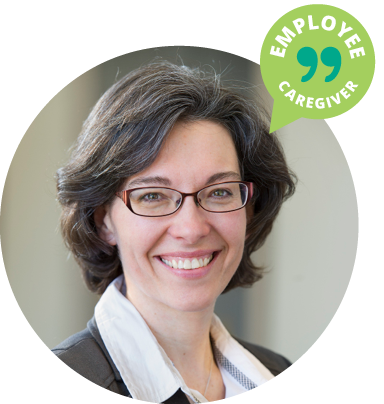Jennifer Hollington,
former ADM, Health Canada,
cared for by her husband and children
My story is a little different in that I am less of a care giver and more of a care receiver. My husband and my children cared for me while I underwent treatment for ovarian cancer, diagnosed in 2020, as well as a second, unrelated cancer (perianal skin cancer), diagnosed in 2021.
That said, I have gained an appreciation of the challenges faced by caregivers by observing the impact of my illness on my loved ones and interacting with readers of my blog, which chronicles my cancer journey. What I’ve learned is that when someone is ill, particularly when they have cancer, we naturally rally around them. However, we are less likely to acknowledge the toll on their loved ones, who may be taking on new responsibilities and often worrying about the future. As the Canadian Cancer Society says, “Family and caregivers…can feel as though they’ve lost their best friend or that they have no one to talk to about what they’re going through.”
I’ve also learned that caring for a loved one who is ill can be as difficult as facing a disease oneself. When I asked readers of my blog how a loved one’s cancer had affected them, one woman—who, like her sister, had dealt with breast cancer—wrote: “my sister and I had the exact same reaction. It was harder on us to watch the other go through a cancer diagnosis and treatment. We both attribute that in part to a perceived lack of control. When you’re going through cancer, you feel like you have some control, but when a loved one is going through it, you feel like you have no control.”
This made me reflect on my time as an executive, before I retired, and how rarely I would say to an employee whose loved one was ill, “this must be so hard on you.” It is helpful to increase awareness of the impact on caregivers of caring for someone who is ill.

“When someone is ill, we naturally rally around them. However, we are less likely to acknowledge the toll on the loved ones who are caring for them.”

“When someone is ill, we naturally rally around them. However, we are less likely to acknowledge the toll on the loved ones who are caring for them.”
Jennifer Hollington,
former ADM, Health Canada,
cared for by her husband and children
My story is a little different in that I am less of a care giver and more of a care receiver. My husband and my children cared for me while I underwent treatment for ovarian cancer, diagnosed in 2020, as well as a second, unrelated cancer (perianal skin cancer), diagnosed in 2021.
That said, I have gained an appreciation of the challenges faced by caregivers by observing the impact of my illness on my loved ones and interacting with readers of my blog, which chronicles my cancer journey. What I’ve learned is that when someone is ill, particularly when they have cancer, we naturally rally around them. However, we are less likely to acknowledge the toll on their loved ones, who may be taking on new responsibilities and often worrying about the future. As the Canadian Cancer Society says, “Family and caregivers…can feel as though they’ve lost their best friend or that they have no one to talk to about what they’re going through.”
I’ve also learned that caring for a loved one who is ill can be as difficult as facing a disease oneself. When I asked readers of my blog how a loved one’s cancer had affected them, one woman—who, like her sister, had dealt with breast cancer—wrote: “my sister and I had the exact same reaction. It was harder on us to watch the other go through a cancer diagnosis and treatment. We both attribute that in part to a perceived lack of control. When you’re going through cancer, you feel like you have some control, but when a loved one is going through it, you feel like you have no control.”
This made me reflect on my time as an executive, before I retired, and how rarely I would say to an employee whose loved one was ill, “this must be so hard on you.” It is helpful to increase awareness of the impact on caregivers of caring for someone who is ill.

